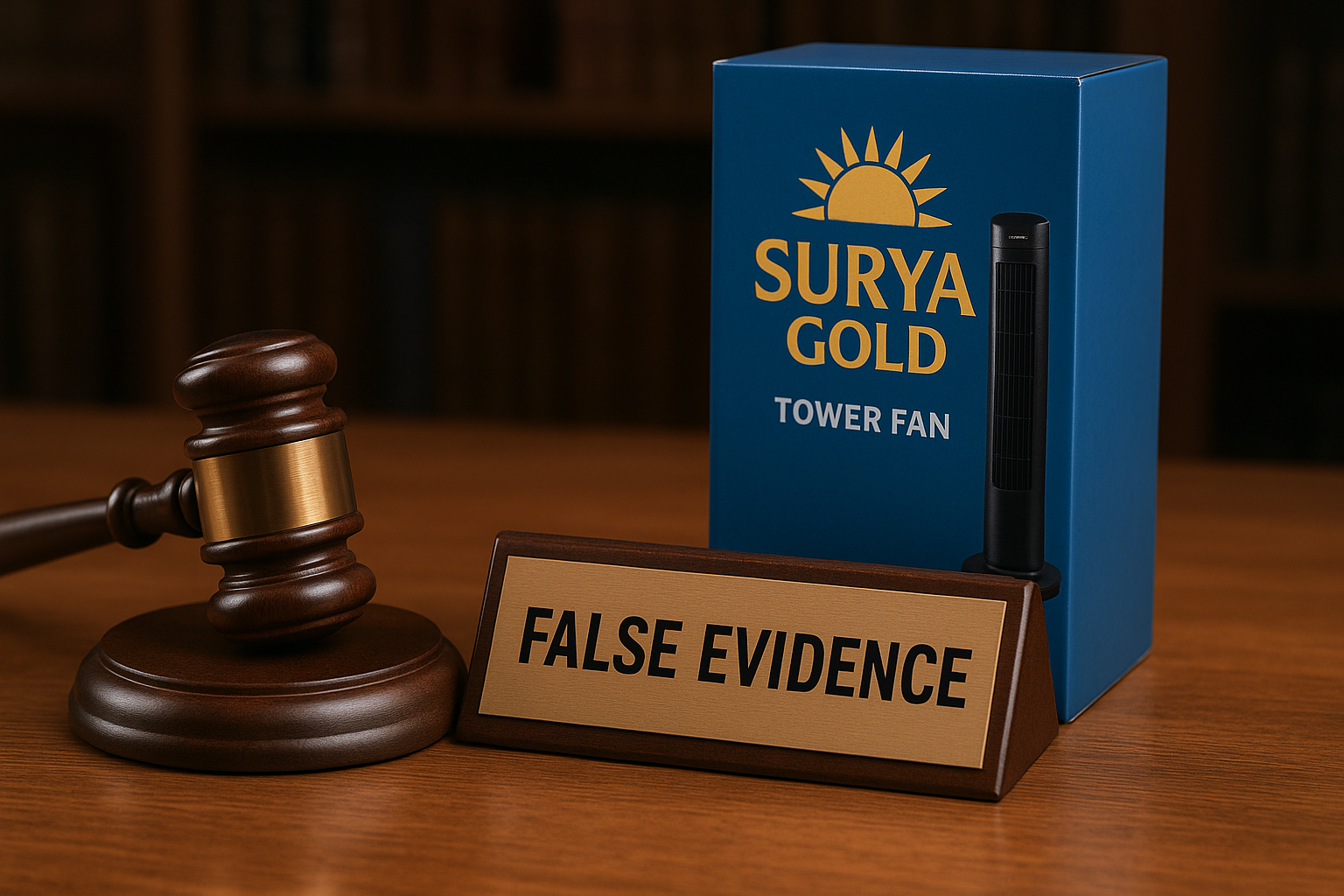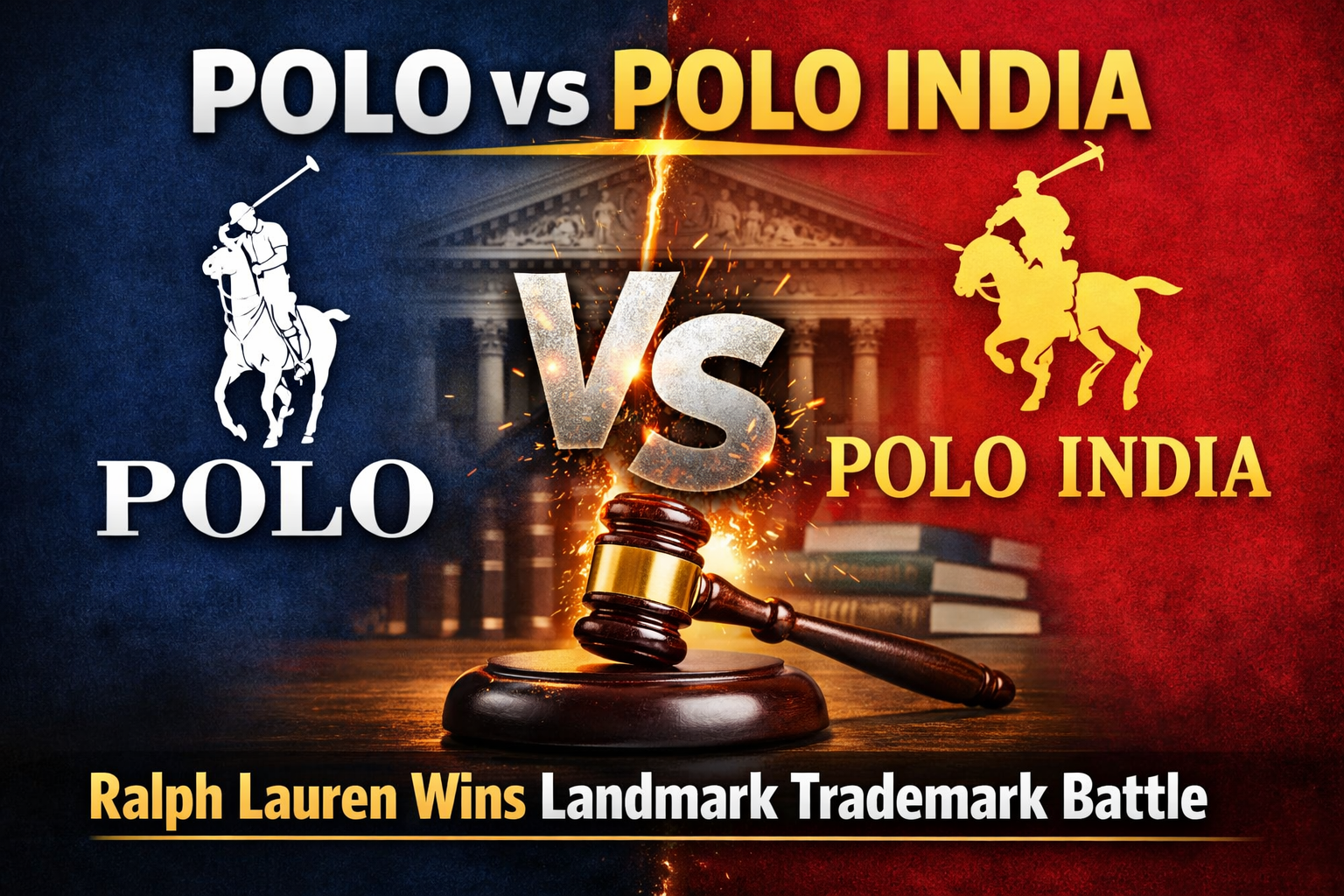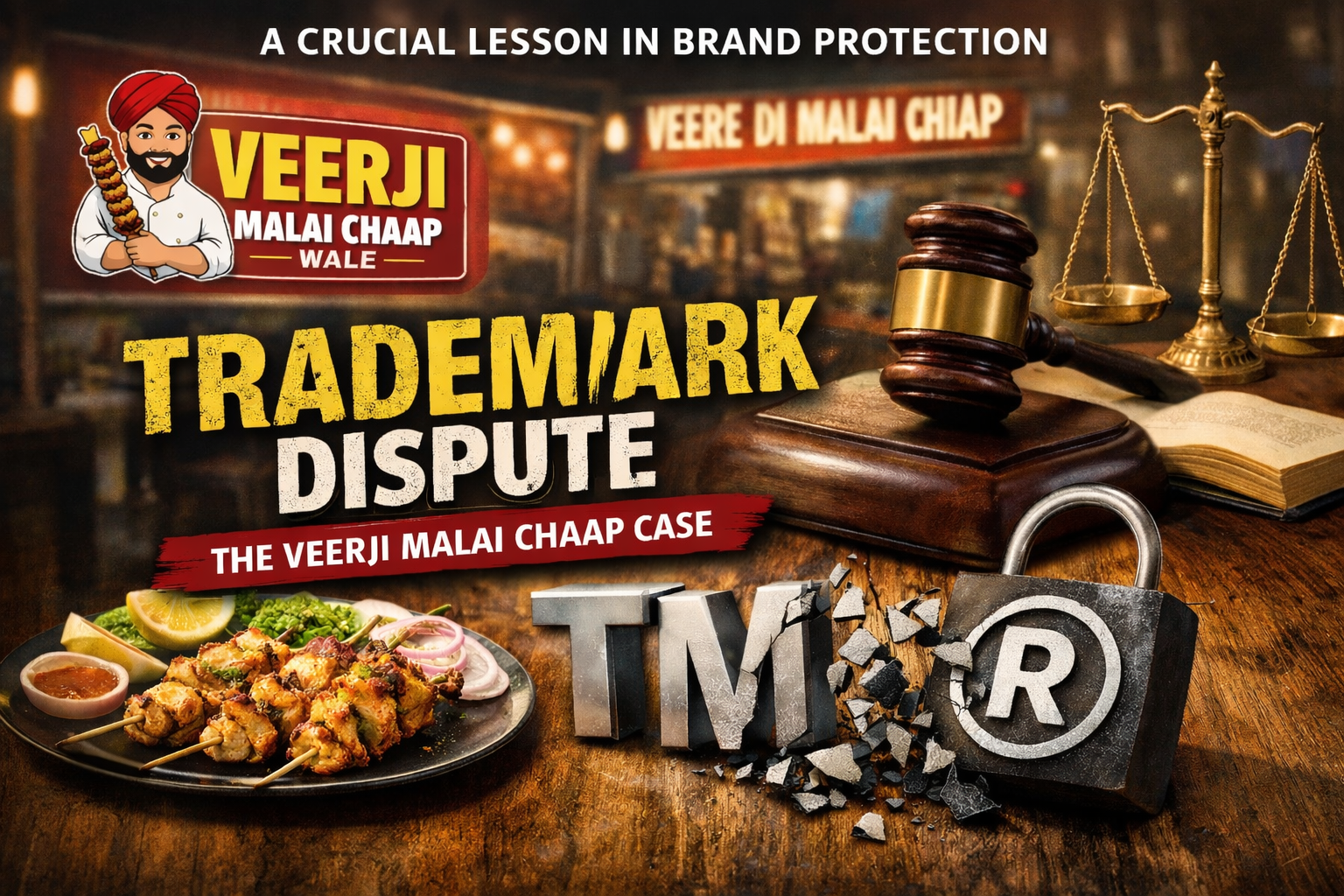
“FALSE EVIDENCE, REAL PENALTIES UNDER SECTION 340 OF CRPC IN THE CASE OF SURYA GOLD TRADEMARK”
INTRODUCTION
Over the past year, a major legal dispute has developed between KG Marketing India and Ms. Rashi Santosh Soni (Navya Enterprises) over the use of the brand “Surya Gold” for tower fans. Both parties claim ownership of the brand and product design, leading to conflict involving trademark rights, design protection, and possible copyright misuse. The case also raises concerns about legal ethics and fair business practices. It highlights the growing importance of protecting intellectual property in India’s competitive electronics market and shows how unclear ownership or improper use of branding can quickly escalate into serious legal battles.
This case is emblematic of the challenges faced by businesses operating in fast-growing sectors where brand recognition and product differentiation are critical. It also underscores the complexities involved in enforcing intellectual property rights in India, where multiple layers of legal protections trademark, design, copyright may overlap and sometimes conflict.
BACKGROUND FACTS
Rashi Santosh Soni Proprietor of Navya Enterprises claimed that they started using the brand name “SURYA GOLD” for their tower fans in November 2014. Over time, they finalized a unique design and blue packaging for the fans by December 2018. To legally protect their product’s appearance, Rashi Santosh Soni obtained a design registration (No. 364771-001 under Class 23-04) on March 21, 2023. Additionally, they applied to register the “SURYA GOLD” trademark under Class 11 (which includes fans) on July 12, 2021. However, another company KG Marketing India filed a lawsuit (CS(COMM) 18/2023) claiming that they were the first to use the brand name. To support their claim, they showed newspaper advertisements dated June and July 2016, which seemed to prove their earlier use of the brand. Based on this, the court granted them an ex-parte interim injunction in January 2023, temporarily stopping Navya Enterprises from using the “SURYA GOLD” brand. Things changed in May 2023, when Navya Enterprises revealed that those newspaper ads were fake. On May 18, 2023, they exposed the forgery, showing that the documents used by KG Marketing were fabricated. After this, KG Marketing admitted to faking the evidence. The Delhi High Court took serious note of fraudulent conduct. The injunction was vacated, the entire suit was dismissed with a cost of 5 lakh awarded to Navya Enterprises, and KG Marketing was permanently restrained from using the trademark “SURYA GOLD.” Moreover, the court directed that criminal proceedings be initiated under Section 340 of the Criminal Procedure Code (CrPC) for filing false evidence and misleading the court. The case highlighted a severe misuse of the legal process and reinforced the principle that court proceedings must be based on truthful and genuine evidence. Thus, it is clear that the injunction KG Marketing obtained was wrong and legally unsustainable.
KEY LEGAL ISSUES
The case presents several critical legal issues surrounding intellectual property rights in India. Firstly, the conflict involves the overlap between trademark and design rights. While KG Marketing claimed ownership of the “Surya Gold” trademark under Class 11, which generally includes electrical appliances such as fans. These claims invoke Sections 27, 29, and 34 of the Trademarks Act, 1999, which address the protection of registered trademarks and remedies against deceptive marketing practices. However, the opposing party contended that this use constituted an infringement of their registered design, which is legally protected under Sections 22 and 23 of the Designs Act. These provisions safeguard the visual appearance and aesthetic elements of a product, including its shape, configuration, color, and packaging. Additionally, the matter raises significant issues of passing off and unfair competition. The defendants alleged that KG Marketing’s use of a similar name and branding was misleading and likely to cause confusion among consumers.
Secondly, the Prior Use Doctrine under Indian trademark law played a pivotal role. Indian courts give significant weight to the party that can prove genuine and continuous use of a mark prior to its registration by another party. Under Section 34 of the Trademarks Act, proven prior use can invalidate the rights of a registered trademark.
Finally, forgery and fabrication of evidence became central when it was alleged that KG Marketing submitted falsified documents. The Delhi High Court took a strict stance, not only vacating the temporary injunction but also initiating contempt proceedings and recommending criminal action under the Indian Penal Code and CRPC laws. This case is one of the earliest to reference India’s criminal codes (Bharatiya Nagarik Suraksha Sanhita (BNSS) and Bharatiya Nyaya Sanhita (BNS), signaling stricter enforcement going forward.
COURT’S ORDERS & IMPACT
The court has delivered several significant orders in the ongoing matter. Firstly, Interim injunction in favor of KG Marketing revoked. This decision came after KG Marketing admitted that the documentation submitted to obtain the injunction was fabricated. The admission severely undermined the credibility of their claims and prompted the court to reverse its earlier order, effectively lifting the protection that had restrained the opposing party. The court issued show-cause notices under Section 340 of the CRPC. These initiated proceedings for alleged perjury and forgery. This section empowers the court to take action when it appears that a party has intentionally given false evidence or produced forged documents. As a punitive and deterrent measure, the court also imposed a cost of rupees 5,00,000/- (Five Lakh) on KG Marketing. Furthermore, the company has been restrained from using the trademark “Surya Gold,” acknowledging the misrepresentation involved in their earlier claim. Although the new criminal laws under the Bharatiya Nagarik Suraksha Sanhita (BNSS) and Bharatiya Nyaya Sanhita (BNS) have come into effect, the court continues to operate under the CRPC. This is due to the transitional period, where older cases are being allowed to proceed under the legal regime in place at the time of filing. The court’s firm actions against KG Marketing also send a clear message to other businesses that fraudulent practices in trademark disputes will not be tolerated and will attract stringent penalties, including criminal prosecution. This approach aims to deter misuse of intellectual property litigation as a tool for unfair competition or harassment. The case has also encouraged companies to maintain meticulous records of their brand use and product designs, as courts increasingly rely on documented evidence of prior use in deciding ownership disputes. It illustrates that proper IP protection involves not only registration but also consistent, verifiable market presence and transparent business conduct.
CONCLUSION
This legal fight between KG Marketing India and Navya Enterprises shows how important it is to protect brand names and product designs in India’s busy electronics market. The case teaches us that companies need to be honest and careful when claiming ownership of a brand. Faking evidence not only hurts a company’s reputation but also leads to serious legal trouble. The court made it clear that lying and cheating in court wouldn’t be tolerated. The case also shows that using a brand first and having proper legal registration really matters, but only if you can prove it honestly. Overall, this situation is a reminder for businesses to play fair, respect the law, and avoid confusing customers. It highlights the need for better rules and stronger protection for brands and designs in India.




Leave a Reply